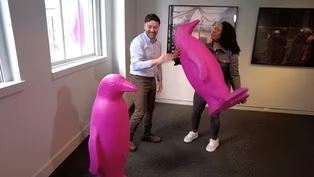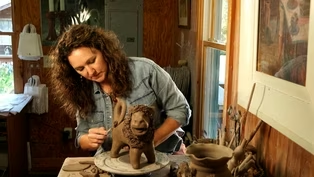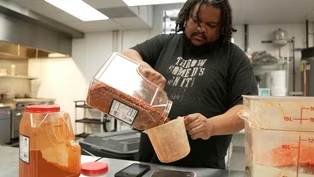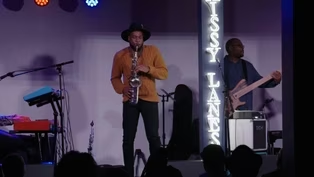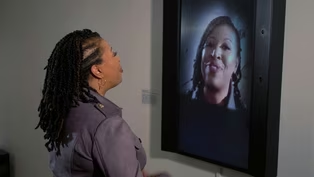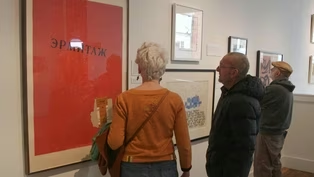
Artists and Makers
Season 21 Episode 15 | 26m 46sVideo has Closed Captions
Meet artists, visit galleries and explore studios around the state.
Meet artists, visit galleries and explore studios around the state.
Problems playing video? | Closed Captioning Feedback
Problems playing video? | Closed Captioning Feedback
North Carolina Weekend is a local public television program presented by PBS NC

Artists and Makers
Season 21 Episode 15 | 26m 46sVideo has Closed Captions
Meet artists, visit galleries and explore studios around the state.
Problems playing video? | Closed Captioning Feedback
How to Watch North Carolina Weekend
North Carolina Weekend is available to stream on pbs.org and the free PBS App, available on iPhone, Apple TV, Android TV, Android smartphones, Amazon Fire TV, Amazon Fire Tablet, Roku, Samsung Smart TV, and Vizio.
Providing Support for PBS.org
Learn Moreabout PBS online sponsorship[piano intro] - Next on North Carolina Weekend, join us from 21c Museum Hotel in Durham as we bring you artists and makers around the state.
We'll meet potter Crystal King in Seagrove, a barbecue savant in Durham, and explore the Black Mountain College Museum.
Coming up next.
- [Narrator] Funding for North Carolina Weekend is provided in part by Visit NC, dedicated to highlighting our state's natural scenic beauty, unique history, and diverse cultural attractions.
From the Blue Ridge and the Great Smoky Mountains across the Piedmont to 300 miles of barrier island beaches, you're invited to experience all the adventure and charm our state has to offer.
[upbeat music] ♪ [upbeat music continues] ♪ [upbeat music continues] ♪ - Hi everyone.
Welcome to North Carolina Weekend.
I'm Deborah Holt Noel, and this week we are featuring artists and makers around the state.
Right now I'm at the 21c Museum Hotel in downtown Durham.
A popular boutique hotel that's also a contemporary art museum, the 21c has several gallery spaces, a wonderful restaurant, even a spa.
We'll explore it more throughout the show.
But first, let's head to Seagrove, the pottery capital of the country and meet Crystal King, a maker who's generating a lot of interest.
[gentle music] Crystal King applies a mane of clay to one of her signature lions.
- I always put a little tuck on the tail that was also done by the original.
- [Deborah] One of Seagrove's most celebrated artists, Crystal literally grew up in the Seagrove tradition.
- My parents, Anna and Terry King went to work with Dorothy and Walter Auman in the early eighties.
Dorothy was an eighth generation potter from here in Seagrove.
She was also one of the first women potters.
She married Walter Auman, who was from one of the other Seagrove legacy families, and together they opened the original Seagrove Pottery.
At five and six years old, when my parents went to interview with Dorothy and Walter to see if it would be a good working environment to apprentice with them, they left me in the back work area with a lump of clay.
[chuckles] A very first piece I hand sculpted, it was an elephant.
I remember it to this day and it was quite good.
They were very surprised when they came back in to see that I had made the piece on my own.
- [Deborah] In addition to functional pottery, the Aumans supported traditional styles and Crystal seemed to have a special talent for it.
- I think being an only child, I didn't have a lot of distractions, so I went everywhere with my parents early on to every show that they did, to visit all of the folk potters that they were interested in visiting.
So by 11 and 12 years old, I was already doing my sculpture work and I was selling at the same shows with them in their booth.
That gave me the sense of pride to continue doing it.
So very important and I guess in the young early years is that people were receiving my work in a way that made me proud enough to continue making and growing with my skill.
- [Deborah] When Crystal was just out of high school, her parents helped her open her own pottery shop.
- So it gave me space to kind of flourish and grow into my own artwork.
- [Deborah] Perhaps no other pottery tradition in the Seagrove area gathers more interest than face jugs.
It is believed that the first of these jugs were made in the mid 1800s by enslaved people in South Carolina.
During the mass production days of Seagrove, potters had little time to make face jugs, but they soon grew in popularity.
- Yes, if you're interested in face jugs, then we share something in common.
What's very interesting in face jugs is that with each family using a specific glaze, a specific firing technique, you can see in the characterization of that face jug, you can tell who made it.
This is a face jug that Terry King, my father made.
This is a melted piece of glass.
It was an old-timey form of decoration that was used by, in the old days, just a a piece of broken glass and it would flow down the piece, decorating it on its own.
We have little control over that, but that's the beauty of it.
And something I love that's a little secret, but my dad has a chin dimple and he often puts it in his jugs.
So I think that just brings a little bit of character to the piece that's unique to him.
- [Deborah] Remember the lion Crystal was working on?
It has a fascinating story.
- About the time that I was 14, a local collector who was well known had brought a postcard from Old Salem, and Old Salem at the MESDA Museum, they have a very important piece in pottery history.
It was one of the Solomon Bell lions from Winchester, Virginia, and it's a part of their permanent collection.
But when he brought in that postcard, he had asked my mother to make one of the lions.
And even then I thought, hmm, I do more animal sculpting than my mom.
If she doesn't make this piece, I'm gonna try it.
So eventually I did try the piece and made a few more and it got a lot of attention because it wasn't a historical piece that I was doing and it was an important piece that I was trying to mimic.
So that really inspired me and it became one of my signature pieces.
To this day, lions are a very important part of what I do, although I have blossomed out to, you know, I do all kinds of animals now, probably hundreds of different pieces.
- [Deborah] Despite the many hours Crystal spends on her craft and gallery, her passion for her art form and the community of Seagrove runs as fiery as the kilns she labors over.
- From the potters that were making thousands of pots and having to export them, basically through train, and wholesale to other areas, to having tourism that was coming in early in the 1920s and thirties because Seagrove was the only place, historically, making these type of pots and that we're still here a hundred years later doing the same thing and drawing people from all over the country to come see us as we live and work in this craft.
So it's really exciting to be a part of that and I really want the experience to be that when people walk in the shop, they're not just seeing a pot being made, you can buy pottery in many places, but what you're seeing here is a little part of two to 300 years of tradition that has evolved through that time into what you see today.
And if I can create that experience for them, that would really be what I desire to do.
[gentle music] - [Deborah] Crystal King Pottery is at 2475 North Carolina Highway 705 in Seagrove, and it's open Monday through Saturday from 10:00 AM to 4:00 PM.
For more information, visit Crystal's website at crystalkingpottery.studio And don't forget the annual Celebration of Spring pottery tour every April in Seagrove.
I just love the architecture here at 21c Museum Hotel.
This grand room is reminiscent of the bank that once stood here.
It was originally called the Hill Building and was designed by the same architects behind the Empire State Building.
You can still see some of the Art Deco designs here.
Now let's learn about another institution from that era.
Black Mountain College was a unique experiment.
It was actually started as a small liberal arts college, but it developed into a leader in the avant-garde arts.
Now let's go learn more about it at a museum in Asheville.
[lively jazz music] - The thing that I'd always been struck by with Black Mountain was this remarkable and anomalous American college, that in a very short lifespan, attracted some of the primary creative thinkers of its time.
- Between 1933 and 1957, you have an unmatched roster of intellectuals and artists at Black Mountain College, including Buckminster Fuller, Josef and Annie Albers, Elaine and Willem de Kooning, John Cage, Merce Cunningham, Robert Rauschenberg, and Jacob Lawrence.
There was probably only a little over 1200 students that actually attended Black Mountain College.
From the very beginning it was a working farm.
There was this idea of sustainability, this idea of how can this be a different type of experience than anything else.
Artists learning from mathematicians, mathematicians learning from artists, the fact that it was owned and operated by the faculty.
The idea that everyone participated, it still continues to reverberate into our society today.
The Black Mountain College Museum and Arts Center is the only museum in the world solely dedicated to the history and legacy of Black Mountain College.
Most of this permanent collection was donated to the museum by either alum from the college or their families.
And we have about 3,000 pieces in our collection.
We also have an expanded library space, and so scholars and visitors from all over the world can come and visit us and we have room for those scholars to work.
As part of our collection, we have a number of fantastic photographs.
One of the photographs is from this play, "The Ruse of Medusa."
And it really captures this moment in 1948 where you have Buckminster Fuller, you have Elaine de Kooning, you have John Cage, Merce Cunningham, all there together in this one photograph.
In the back in the library, hanging right now, we have an amazing Ruth Asawa sculpture.
She was an Asian American artist and she happened to be at the college during a time when Buckminster Fuller was there.
And there's a connection between Fuller's work in math and also in design and Ruth Asawa's work.
Also in our library on the opposite of the Ruth Asawa sculpture, we have six color studies from "The Interaction of Color" by Josef Albers.
And they really illustrate what Albers was teaching and what he was thinking about during the college years.
Where we're sitting right now is in our main gallery space and it's about a little less than 3,000 square feet.
And it's a modular space.
We have movable walls.
If we had a film screening or a music performance, we could accommodate up to 180 people sitting in this space.
♪ Freedom day ♪ ♪ It's freedom day ♪ - I'd say, to come to the Black Mountain College Art Museum because it gives a lot of history about the place and also it connects the art scene now to the history of arts in Black Mountain College.
- It's so unprobable that this place could have happened in Western North Carolina with these personalities.
It's something that could never have happened in any other place, in any other time.
So if you're interested in learning about what was the beating heart behind Black Mountain College, please come and visit us.
There's nothing else like this in the world.
- [Deborah] The Black Mountain College Museum + Arts Center is at 120 College Street in Asheville, and it's open Tuesday through Saturday from 11:00 AM to 5:00 PM.
For more information, give them a call at 828 350-8484 or visit them online at blackmountaincollege.org.
Well, I'm here with John Blanco, the manager of 21c Museum Hotel here in Durham.
John, thank you so much for hosting us.
Tell me a little bit about the concept of merging contemporary art into a boutique hotel.
- Thank you, Deb.
Yeah, it really is an opportunity to make contemporary art available to the public, free, open 24 hours with a belief that contemporary art has the ability to create space for difficult conversations, possibly indifference or to experience something that you may not have thought of.
- [Deborah] John took me for a tour.
I loved the clouds floating along the stairway.
So being a hotel, certainly you can stay the night here - [John] In a stunning contemporary art museum.
Over 125 guest rooms in this boutique hotel.
- [Deborah] 21c Hotels are famous for their penguins and they show up everywhere.
21c offers a Dining With Art experience at their acclaimed Counting House restaurant.
And the bar has an amazing piece right over your head.
The small but elegant spa is a great place to unwind.
But back to the art Be sure to sign up for a personal tour.
I learned so much from John and it was really fun.
- And there's, unlike other museums, there's no, you know, there's not like docents or guards standing in each gallery space.
And so there's really a trust and empowerment making contemporary art that has a lot to say, you know, available to anyone who can come through the building, you know, into the door.
- The 21c Museum Hotel is at 111 North Corcoran Street in Durham.
To find out more about their latest art installation, book a room or get reservations for dinner at Counting House, go to their website at 21cmuseumhotels.com/durham.
Visitors and locals love 21c because it's located at the center of the Bull City's hottest attractions.
In fact, just two blocks from here on Main Street is one that's pretty new but will thrill lovers of live music.
Come with me to Missy Lane's Assembly Room where Cicely Mitchell has created an elegant but relaxed space for jazz.
[relaxed jazz music] - On any given day, Missy Lanes is a lot of things.
First and foremost, a music venue.
We've got the coffee, and then a cocktail bar by night.
The overall story of how we even got to Missy Lane's is very Durham.
I'm Cicely Mitchell and I'm one of the co-owners of Missy Lane's.
[audience applauds] [gentle piano jazz music] There hasn't been a new, you know, fully dedicated music venue in over 10 years in downtown Durham.
Second, there was really no place for Black American music as a home.
Sometimes people say, you know, "jazz is dead" or what have you, but there are modern day working jazz musicians in this area.
- Malcolm Jamal Warner.
- With Missy Lanes, [audience applauds] we are building the audience for jazz, plus we're presenting.
[jazz drums filling] Durham is a hotbed for people who play it, but then people who would listen to it.
We have a very progressive thought about arts culture, part of Black Wall Street and what we feel is the new renaissance of Black business coming out of the pandemic.
And so Durham's a perfect place.
[light jazz music] The name Missy Lane's is a flip on my middle name.
So my middle name is Elaine.
And when my grandfather used to call me when I was young, he'd be like, "Come here, Miss Elaine, come here Miss Elaine."
It sounded like Missy Lane, not Miss Elaine.
So like in the jazz tradition, you know how things you turn a phrase and you scat or what have you.
So we came up with Missy Lane.
As far as the experience, it is never the same each night.
[percussive jazz music] That was one thing that I learned when I was learning about jazz and experiencing jazz.
There are many formats to it.
The way we set this space up, it has three different rooms.
So on Thursday nights we do the Central's Jazz Studies Jam Session, and we do that in the front room and that's more in a relaxed setting.
People can come and go as they please.
In the showroom we have actual shows like what you would see at the Blue Note in New York or at Ronnie Scott's in London where you buy a ticket and then you sit down to a seated show and it's more kind of intimate theater style.
So you can have your French 75s or your Old Fashioneds and sit back and enjoy the music.
The space before we took over the lease was Old Havana Sandwich Shop and that was a Cuban sandwich shop and they used to do Latin jazz and have dancing.
So we got in touch with the old owners and so we told them about our concept and they loved it.
And so every last Wednesday of the month, we call it Old Havana Nights and we kind of relive the fact that Old Havana used to do Latin jazz here.
[relaxed shuffling jazz music] Definitely see this place as being a legendary jazz stop for many years to come.
People will come out and make memories, you know, whether it's for anniversaries, birthdays, or just, you know, a great night out.
[singer vocalizing] [soft jazz music] - You immediately are taken away from the outside world.
Once you step in here, you become immersed in whatever artist is playing or whatever sounds you're hearing, you get a chance to escape.
And to me, I love the fact that it's an intimate area where people who are like-minded can enjoy the arts and can appreciate live musicianship and the professionalism and the language that they speak to.
- I love to provide the drinks, I love to talk to people.
The best part about it really is being behind there and actually getting to see everything, hear all the music and just be a part of it.
- The caliber of talent was top-notch, top tier.
Well curated event, beautiful experience.
- You better come and experience the beautiful building and the great artists that come here and enjoy.
Have fun in Durham.
- Give us a try.
We'll be here to entertain you.
[smooth jazz music] - Missy Lane's Assembly Hall is located at 310 East Main Street in Durham and they're open during varied hours throughout the week for coffee and live performances.
For the latest schedules and tickets to upcoming shows, visit them online at missylanes.com.
Now let's head to East Durham to meet another young maker.
Mike De Los Santos fell in love with barbecue from a young age and went on to create barbecue sauces and rubs that won many awards.
Now he's opened a bricks and mortar restaurant called Mike D's and it's gotten rave reviews.
Let's learn his inspiring story.
[torch hissing] [fire crackling] - Yeah, all the smells of all the food on the burners, you can smell it all.
You can smell pork and vinegar and I was like, that smell, that's the smell.
Whatever that is, I gotta find that.
[reflective piano music] Life had all kind of turns like I didn't, I left the food space, went and started a career.
I was working in the nonprofit world.
And then using barbecue on the weekend as like a way to de-stress.
Started sort of experimenting with like my own sauces and rubs because I wanted to find like the right sort of flavor mixture that I was looking for.
But I still kept telling myself like, I'm not a business person, so like this is not a thing.
Life had another sort of twist.
Wife and I, we had a son, his name was Aaron.
He lived exactly six months.
[melancholic music] Aaron was born with a heart condition called hypoplastic left heart syndrome.
So in simple terms, that just means that the left side of his heart never developed.
And so he basically had half of a functioning heart.
I was holding him as he like, he took his last breath, his heartbeat for the last time.
And just like sort of reflecting over those six months was just kind of seeing this kid who like couldn't speak for himself.
All he could do was try to live.
And like seeing that, I just had to honor it in some way, right?
And that's where Mike D's BBQ came about because I was like, I gotta chase my dreams.
Coming from like a social justice advocacy family, to be like sleeping with the fist up.
Like...
The business is really about trying to leave a legacy for my family and also honoring Aaron's memory.
And so that's the thing like, you know, business is hard.
There's a lot of like really tough moments.
And the thing that really gets me through those really tough moments is reflecting on Aaron and you know, trying to keep fighting like he fought.
[door thuds] We have a really, really, really great space that we're in.
And so I'm glad that all the other things fell apart and this, it made an opportunity for us to be where we are right now.
It allowed us to stay in East Durham.
East Durham is just this great community.
I tell people, you gotta come to East Durham.
'cause East Durham has a vibe.
And people come, whether they're going to get food, or getting a cup of coffee, right?
There's just this vibe in East Durham that people like to spend time and talk to each other, get to know each other.
The community supports each other.
And so we happen to be in this building that used to be Garland Woodwork, like we were able to rework this space, this building that was abandoned, falling apart.
and we were able to turn that into this beautiful space that we have now.
[light soulful jazz music] So you have myself, Mike D's BBQ, there's a courtyard right next to us.
There's the Congress Social Bar, and then right next to them is Proximity Brewing, which is the first Black owned brewery in Durham.
We have the space and we're, as businesses trying to build community, right?
So you can take your food, sit in Congress, you can take your food and sit in Proximity.
People can eat barbecue, get cocktails and get great beer all at the same time.
Our sauces and rubs kind of are a reflection of me.
I wanted to find a way to mix African American and Hispanic culture together.
My dad is from the Dominican Republic.
My mom was from, you know, Clarksville, Tennessee in tobacco fields, and so I wanted to kind of bring that together.
And outside of that, like it's really just like my method of smoking.
My rub combined with that wood flavor and like even down to the timing, right?
Like I cook my ribs a little faster than other people cook their ribs, right?
So all that is just sort of like my stamp on it.
Ribs are probably one of our more popular items.
On the meat side we have ribs, we have pulled pork, we have brisket, we do smoked turkey, we do leg quarters and we do smoked chicken salad.
None of our sides have meat in them.
- The sides we sell here, smoked corn which is my personal favorite.
We sell smoked beans, we sell mac and cheese, coleslaw and potato salad.
I couldn't have asked for a better job.
He really makes the work environment a safe place to be yourself.
- Barbecue means community.
Like for me, living here in the south, go to some of the deepest south parts where you think there's gonna be a lot of racism, be a lot of issues.
But you walk into a barbecue joint, everybody's talking about the barbecue.
Everybody's engaging in conversation.
And I like to tell people that like, we probably could get world peace if we just have more barbecues because there's something about wood, fire, meat together, the smell, the crackling of the wood, like all that, that makes people just be humans together.
- Mike D's BBQ Smokehouse is at 455 South Driver Street in Durham and it's open Wednesday through Sunday.
For more information, give Mike a call at 866 960-8652 or go online to mikedsbbq.com.
Well that's it for tonight's show.
We've had a great time here at the 21c Museum Hotel exploring our curiosity.
And if you've missed anything in tonight's show, just remember you can always watch us again online at pbsnc.org, or you can find us on our YouTube channel.
Have a great North Carolina Weekend, everyone.
[bright upbeat music] ♪ [upbeat music continues] ♪ [upbeat music continues] ♪ [upbeat music continues] ♪ [upbeat music continues] ♪ - [Narrator] Funding for North Carolina Weekend is provided in part by Visit NC, dedicated to highlighting our state's natural scenic beauty, unique history and diverse cultural attractions.
From the Blue Ridge and the Great Smoky Mountains across the Piedmont to 300 miles of barrier island beaches, you're invited to experience all the adventure and charm our state has to offer.
[gentle music]
Video has Closed Captions
Clip: S21 Ep15 | 2m 12s | Check out the contemporary art at the 21c Museum Hotel in Durham. (2m 12s)
Video has Closed Captions
Clip: S21 Ep15 | 5m 56s | Potter Crystal King keeps folk pottery traditions alive in Seagrove. (5m 56s)
Video has Closed Captions
Clip: S21 Ep15 | 5m 37s | Mike De Los Santos brings his award winning barbecue and rubs to East Durham. (5m 37s)
Video has Closed Captions
Clip: S21 Ep15 | 5m 2s | Missy Lane’s Assembly Room is a social hub for music lovers in downtown Durham. (5m 2s)
Video has Closed Captions
Preview: S21 Ep15 | 21s | Meet artists, visit galleries and explore studios around the state. (21s)
Black Mountain College Museum and Arts Center
Video has Closed Captions
Clip: S21 Ep15 | 3m 51s | Black Mountain College is long gone, but a museum exploring its legacy lives on. (3m 51s)
Providing Support for PBS.org
Learn Moreabout PBS online sponsorshipSupport for PBS provided by:
North Carolina Weekend is a local public television program presented by PBS NC
